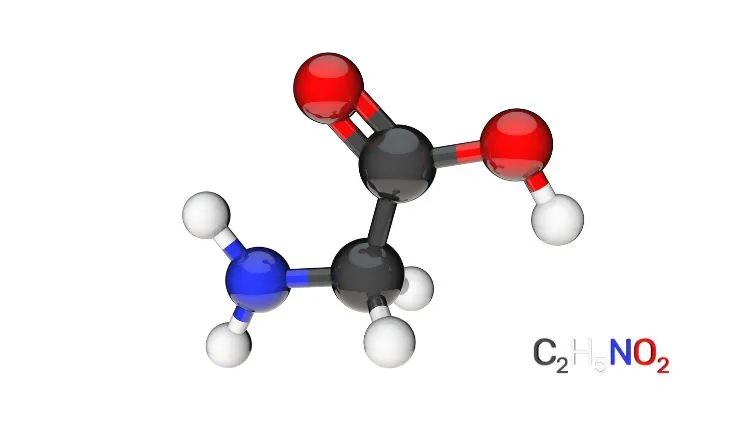Glycine is a non-essential amino acid that is a building block for protein synthesis. It’s also needed to produce antioxidants, hormones, and a slew of other compounds required for your body to run optimally. Your body naturally produces glycine, but external glycine supplements may benefit antioxidant defenses, sleep, memory, immunity, and more.
Quick Look:
- Glycine is a non-essential proteinogenic amino acid involved in forming functional proteins.
- Serine, choline, hydroxyproline, and threonine are required to form glycine.
- The health benefits of glycine supplements range from sleep and immunity to muscle growth and memory.
- The human body requires 2 grams of dietary glycine, but you can add more glycine by supplementing around 3 grams of glycine powder.
Table of Contents
What is Glycine?

Glycine is one of eleven non-essential proteinogenic amino acids produced in the body that are involved in protein synthesis and other essential processes. As a non-essential amino acid, glycine supplements aren’t a must—as long as you’re getting enough of the precursor amino acids to form glycine, your body can produce it on its own (but that doesn’t mean you should forgo supplementing altogether).
So, what are those precursors?
- Serine
- Choline
- Hydroxyproline
- Threonine
The amino acids listed above are essential, meaning you must consume them either through food or supplements, and without sufficient amounts, your body can’t produce functional proteins, and systems won’t work as they should.
Back to glycine.
Apart from its involvement in protein synthesis, glycine also plays several other key roles in the body, ranging from regulating gene expression and protein configuration to antioxidant synthesis and supporting sleep.
Most people following a diet incorporating animal products consume sufficient glycine to meet their daily needs. Still, studies suggest that a mild glycine deficiency could play a role in the etiology of metabolic diseases. What does that mean? Ensure you’re meeting your daily glycine requirements to avoid potential health issues.
What Does Glycine Do?
As a proteinogenic amino acid, one of glycine’s primary roles is to help build functional proteins, but it’s also a major neurotransmitter in the central nervous system (CNS). In fact, it has a dual role—an excitatory and inhibitory neurotransmitter. It operates in the CNS via N-methyl-D-aspartate type glutamate receptors and glycine receptors, respectively.
Let’s break that down a bit.
There are two types of neurotransmitters in the body:
- Excitatory neurotransmitters: Promotes action potential generation and increases activity of the nervous system.
- Inhibitory neurotransmitters: Inhibits action potential generation and reduces CNS activity.
Here’s an example.
The release of acetylcholine (Ach) at a synapse between a nerve and muscle depolarizes the postsynaptic membrane. This depolarization is called an excitatory postsynaptic potential (EPSP), resulting in a higher probability of the postsynaptic neuron firing an action potential. Therefore, acetylcholine is an excitatory neurotransmitter. In contrast, the release of GABA (gamma-aminobutyric acid) from a presynaptic neuron hyperpolarizes the cell membrane and reduces the probability that a neuron will fire an action potential. As such, GABA is an inhibitory neurotransmitter.
Glycine can function as both, depending on which receptor it binds to.
Key takeaway: Glycine functions as an excitatory and inhibitory neurotransmitter depending on its binding site and can excite or relax the nervous system.
What is Glycine Used For?
Now that you’re familiar with glycine, you might be wondering, what is glycine good for?
As an amino acid and neurotransmitter, glycine plays critical roles in nearly every system in the body. Some of the most notable functions include:
- Increases lean muscle mass
- Prevents sarcopenia (age-related muscle wasting)
- Promotes collagen synthesis (protects cartilage and joints)
- Increases serotonin production
- Reduces inflammation and enhances the production of glutathione
- Promotes creatine production
- Supports mood, memory, and cognitive function
Keep reading to learn about all of the glycine benefits!
8 Glycine Benefits
Improves Sleep

If you’re in the market for some shut-eye ASAP, glycine can help with that. Although several other compounds offer health benefits for sleep, glycine provides a few unique pathways to support better sleep quality:
- Supports serotonin production: Serotonin might be the hormone that puts you in a good mood, but it’s also the precursor to the sleep hormone melatonin. Glycine supplements have been shown to increase levels of serotonin in the brain, which may translate to increased levels of melatonin when taken before bed.
- Reducing core body temperature: Core body temperature naturally drops during sleep to help you fall asleep faster, stay asleep longer, and conserve energy. While several factors influence how much your body temperature does (or doesn’t) drop, taking glycine a couple of hours before bed has been shown to help reduce core temperature to facilitate a good night’s sleep.
- Improves sleep latency: Sleep latency refers to the time it takes you to fall asleep, and research shows glycine supplements can help shorten sleep onset.
- Reduces insomnia symptoms: There isn’t much evidence linking glycine and insomnia, but some studies suggest it may help alleviate insomnia symptoms, potentially by boosting serotonin and melatonin levels.
Need more proof? A study published on the glycine administration before bed found that 3 grams of glycine given one hour before bed reduced feelings of daytime fatigue, while another study observed similar results, showing that 3 grams of glycine helped participants fall asleep faster, improved sleep efficiency, and decreased daytime fatigue.
Supports Mood and Memory
Glycine promotes the production of serotonin, your “happy” hormone, which can help enhance mood, improve sleep, and boost memory and other cognitive processes.
Glycine also functions as a key neurotransmitter in the central nervous system, facilitating sensory and motor communication within the brain. Specifically, glycine acts on N-methyl-D-aspartate (NMDA) receptors to elicit excitatory effects, which have been linked to enhanced neuroplasticity, memory, and learning.
Protects Against Muscle Loss

Glycine is one of a handful of amino acids required to produce collagen, the most abundant protein in your body’s connective tissues (skin, muscles, tendons, ligaments, etc.). It’s suggested that collagen production is at its highest during the second and third decades of life, then declines as you age. This is why fine lines and wrinkles emerge, skin starts to sag, and your hair and nails become more brittle.
If you want to avoid the pitfalls of aging, which include muscle wasting or sarcopenia, boosting your glycine intake might help to counteract this natural process. Studies have shown that a glycine deficiency reduces collagen turnover, which may exacerbate or accelerate aging processes, including muscle wasting.
Pro tip: Grass-fed collagen supplements are widely available in health food stores and online to promote stronger and healthier connective tissues. Consuming bone broth is another great way to get more glycine and collagen/gelatin in your diet!
Supports Creatine Production
Glycine is one of three amino acids involved in making creatine, a non-proteinogenic amino acid that supports ATP (energy) production for the muscles and brain. The research on creatine is endless, so it’s no wonder why it’s one of the most widely used fitness supplements on the market.
Creatine supplementation combined with resistance training has been shown to increase lean muscle mass and muscular strength, but short-term supplementation has also been shown to benefit short-term memory, intelligence, reasoning, and memory.
Boosts Immunity

Along with cysteine and glutamate, glycine is required to produce the master antioxidant, glutathione (GSH). It’s involved in several body systems, especially the immune system, where it plays a significant role—combating free radicals that are a contributor to chronic health problems like cardiovascular and inflammatory disease, cataracts, and cancer. Antioxidants like glutathione prevent free radical-induced tissue and cellular damage by inhibiting the formation of radicals, scavenging them, or promoting decomposition.
Insufficient glycine can adversely affect glutathione production and result in a glutathione deficiency and can therefore impact how your body handles oxidative stress. Low-grade inflammation caused by oxidative stress is an underlying factor in several chronic diseases. However, glycine has a wide range of anti-inflammatory, cytoprotective, and immunomodulatory properties.
Promotes Antioxidant Defenses
The human body has a built-in antioxidant defense system to combat free radicals and reduce oxidative stress. Although several antioxidants are present in the body, glutathione is one of the most potent.
Without sufficient glutathione, free radicals can build up and cause damage to healthy cells, leading to oxidative stress—and oxidative stress is an underlying factor in many chronic diseases, including neurological diseases, cardiovascular disease, diabetes, cancer, and more.
Because glycine is required for glutathione synthesis, maintaining sufficient levels is vital for mitigating inflammation and oxidative stress and warding off diseases caused by excessive free radical damage.
Improves Insulin Sensitivity
Insulin resistance is one of the hallmark symptoms of type 2 diabetes, and research suggests that glycine may benefit the insulin response. Oxidative stress is just one link between obesity and insulin resistance due to high reactive oxygen species (ROS) levels. Because glycine can increase glutathione levels to reduce oxidative stress, it may provide important metabolic benefits by improving insulin sensitivity.
Protects Heart Health

In addition to promoting lower blood pressure and reducing the risk of obesity, oral supplementation with glycine powder may also help improve heart health and lower the risk of a heart attack.
A 2016 study found that participants experiencing chest pain who had higher plasma glycine levels had a more favorable risk profile for heart disease and a lower risk of heart attack. They found that glycine improved low-density lipoprotein (LDL) cholesterol levels and apolipoprotein B (ApoB); ApoB is the primary protein found in LDL cholesterol and is often used to determine heart attack risk.
Key takeaway: Oral glycine supplementation offers many health benefits, including supporting muscle growth, bolstering immunity, improving insulin sensitivity, and protecting heart health.
What’s the Right Glycine Dosage Per Day?
Food sources should supply about 2 grams of glycine daily for optimal body functions, but the average intake of dietary glycine could vary from 1.5 to 3 grams per day depending on the individual’s protein intake. One study showed that the average daily glycine intake ranged from 2.28 to 3.12 grams per day in adult males with varying dietary protein sources (meat or fish eaters, vegetarians, or vegans).
As for glycine supplements, the recommended dose is around 3 grams daily for beneficial effects on sleep quality, connective tissue health, and immunity. However, in cases where schizophrenia is present, individuals may be able to handle higher doses of up to 30 grams daily without adverse side effects.
Key takeaway: Glycine supplement dosage may vary based on your specific needs, but most experts recommend about 3 grams per day from supplements and an average of 2 grams per day from dietary sources.
Food Sources of Glycine
Want to beef up your glycine intake through diet? Here are some of the best foods to help you!
- Bone broth (gelatin)
- Red meat
- Seeds
- Turkey
- Chicken
- Pork
- Peanuts
- Canned salmon
In addition to what we just mentioned, smaller amounts of glycine are found in:
- Beans/legumes
- Spinach
- Kale
- Cauliflower
- Cabbage
- Pumpkin
- Banana
- Kiwi
Side Effects of Glycine Supplements
Before taking a glycine supplement, you’ll want to be aware of potential side effects. Although adverse reactions aren’t common with glycine supplementation, it doesn’t mean they’re exempt—so you’ll want to know what to look for.
Glycine is generally considered safe and is well-tolerated by most healthy adults, but the following side effects may occur in some individuals:
- Nausea
- Vomiting
- Stomach upset
- Soft stools
- Fatigue
That said, two groups of people should avoid taking glycine supplements:
- Pregnant or breastfeeding women: There is insufficient evidence on the effects of glycine supplements during pregnancy and lactation. As such, pregnant or breastfeeding women should avoid glycine supplements. However, reaching your daily glycine requirements through diet is still crucial during pregnancy or lactation.
- Schizophrenia drugs: People taking the drug Clozapine (brand name Clozaril) for schizophrenia should avoid glycine supplements, as the combination could reduce the effectiveness of the medication.
If you’re unsure whether supplementing with glycine is safe, consult your healthcare provider before starting or adding a new dietary supplement to your regime.
What Are the Symptoms of Low Glycine Levels in Adults?
Because glycine is one of the non-essential amino acids your body can produce from other amino acids, a glycine deficiency isn’t common. However, a lack of dietary protein can lead to an imbalance in amino acids and resulting health consequences.
Research suggests that a shortage of the amino acid glycine in small amounts isn’t harmful to health, but a long-term or severe deficiency can lead to the following outcomes:
- Weakened immune response
- Poor growth
- Abnormal nutrient metabolism
Conclusion
Whether you’re after a more robust immune system, healthier skin and hair, or better quality sleep, glycine benefits are virtually endless. Although high-protein animal foods like meat and bone broth provide high concentrations of this amino acid, adding 2 grams of supplemental glycine will ensure levels remain high to reap all the benefits this amino acid offers.
Frequently Asked Questions
Is glycine a protein?
No, glycine is a non-essential proteinogenic amino acid your body uses to produce functional proteins. It is made from other amino acids, including choline, serine, hydroxyproline, and threonine.
Can you take too much glycine?
Glycine toxicity is rare, especially through proper supplementation and dietary intake, but it can occur when used with sterile water for bladder irrigation. This process is where glycine is administered, typically after prostate or bladder surgery, to prevent or flush out blood clots. The most common signs of glycine toxicity include visual disturbances, drowsiness, weakness, vomiting, paresthesia, and skin flushing.
What does glycine do in the body?
Glycine is an amino acid with several vital roles in the body. It is a precursor for essential compounds, including glutathione, porphyrins, purines, heme, and creatine. It’s also an inhibitory and excitatory neurotransmitter in the CNS and has antioxidant, anti-inflammatory, cryoprotective, and immunomodulatory properties.
Does glycine help with weight loss?
Glycine isn’t typically referred to as a “weight loss supplement”, but some research suggests that when used with caloric restriction, glycine may help preserve lean muscle tissue and stimulate fat loss. Glycine also helps reduce core body temperature to improve sleep quality, which may indirectly contribute to weight loss.
What does glycine do in the brain?
Glycine acts as a neurotransmitter in the brain. When bound to NMDA receptors, glycine exhibits excitatory effects; binding to glycine receptors elicits inhibitory effects on the brain.
Does glycine cause weight gain?
No, glycine supplements do not cause weight gain. Research suggests that increasing plasma glycine levels can increase lean muscle and reduce fat mass. Evidence also shows that in metabolic disorders linked to obesity, type 2 diabetes, and non-alcoholic fatty liver disease (NAFLDs), lower circulating glycine tends to be present.
How much glycine should I take daily through glycine supplementation?
Consuming about 2 grams of glycine per day through diet is recommended. The benefits of glycine supplements are achieved with an average dose of 3 grams.














